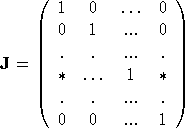E.G. Smirnova, Omsk State University, Mathematical Department
1. Introduction
Let G=Fn/V be a free in some variety group of rank n. An element  is called primitive if and only if g can be included in some basis g=g1,g2,...,gn of G. The aim of this note is to consider a presentation of elements of free groups in abelian and metabelian varieties as a product of primitive elements. A primitive length |g|pr of an element is called primitive if and only if g can be included in some basis g=g1,g2,...,gn of G. The aim of this note is to consider a presentation of elements of free groups in abelian and metabelian varieties as a product of primitive elements. A primitive length |g|pr of an element  is by definition a smallest number m such that g can be presented as a product of m primitive elements. A primitive length |G|pr of a group G is defined as is by definition a smallest number m such that g can be presented as a product of m primitive elements. A primitive length |G|pr of a group G is defined as  , so one can say about finite or infinite primitive length of given relatively free group. , so one can say about finite or infinite primitive length of given relatively free group.
Note that |g|pr is invariant under action of Aut G. Thus this notion can be useful for solving of the automorphism problem for G.
This note was written under guideness of professor V. A. Roman'kov. It was supported by RFFI grant 95-01-00513.
2. Presentation of elements of a free abelian group of rank n as a product of primitive elements
Let An be a free abelian group of rank n with a basis a1,a2,...,an. Any element  can be uniquelly written in the form can be uniquelly written in the form
 . .
Every such element is in one to one correspondence with a vector  . Recall that a vector (k1,...,kn) is called unimodular, if g.c.m.(k1,...,kn)=1. . Recall that a vector (k1,...,kn) is called unimodular, if g.c.m.(k1,...,kn)=1.
Лемма 1. An element  of a free abelian group An is primitive if and only if the vector (k1,...,kn) is unimodular. of a free abelian group An is primitive if and only if the vector (k1,...,kn) is unimodular.
Доказательство. Let  , then , then  . If c is primitive, then it can be included into a basis c=c1,c2,...,cn of the group An. The group . If c is primitive, then it can be included into a basis c=c1,c2,...,cn of the group An. The group  (n factors) in such case, has a basis (n factors) in such case, has a basis  , where , where  means the image of ci. However, means the image of ci. However,  , that contradics to the well-known fact: An(d) is not allowed , that contradics to the well-known fact: An(d) is not allowed  generating elements. Conversely, it is well-known , that every element c=a1k1,...,ankn such that g.c.m.(k1,...,kn)=1 can be included into some basis of a group An. generating elements. Conversely, it is well-known , that every element c=a1k1,...,ankn such that g.c.m.(k1,...,kn)=1 can be included into some basis of a group An.
Note that every non unimodular vector  can be presented as a sum of two unimodular vectors. One of such possibilities is given by formula (k1,...,kn)=(k1-1,1,k3,...,kn)+(1,k2-1,0,...,0). can be presented as a sum of two unimodular vectors. One of such possibilities is given by formula (k1,...,kn)=(k1-1,1,k3,...,kn)+(1,k2-1,0,...,0).
Предложение 1. Every element  , ,  , can be presented as a product of not more then two primitive elements. , can be presented as a product of not more then two primitive elements.
Доказательсво. Let c=a1k1...ankn for some basis a1,...an of An. If g.c.m.(k1,...,kn)=1, then c is primitive by Lemma 1. If  , then we have the decomposition (k1,...,kn)=(s1,...,sn)+(t1,...,tn) of two unimodular vectors. Then c=(a1s1...ansn)(a1t1...antn) is a product of two primitive elements. , then we have the decomposition (k1,...,kn)=(s1,...,sn)+(t1,...,tn) of two unimodular vectors. Then c=(a1s1...ansn)(a1t1...antn) is a product of two primitive elements.
Реклама

Corollary.It follows that |An|pr=2 for  . ( Note that . ( Note that  . .
3. Decomposition of elements of the derived subgroup of a free metabelian group of rank 2 as a product of primitive ones
Let  be a free metabelian group of rank 2. The derived subgroup M'2 is abelian normal subgroup in M2. The group be a free metabelian group of rank 2. The derived subgroup M'2 is abelian normal subgroup in M2. The group  is a free abelian group of rank 2. The derived subgroup M'2 can be considered as a module over the ring of Laurent polynomials is a free abelian group of rank 2. The derived subgroup M'2 can be considered as a module over the ring of Laurent polynomials
 . .
The action in the module M'2 is determined as  ,where ,where  is any preimage of element is any preimage of element  in M2, and in M2, and
 . .
Note that for  , ,  we have we have
(u,g)=ugu-1g-1=u1-g.
Any automorphism  is uniquelly determined by a map is uniquelly determined by a map

 . .
Since M'2 is a characteristic subgroup,  induces automorphism induces automorphism  of the group A2 such that of the group A2 such that


Consider an automorphism  of the group M2, identical modM'2, which is defined by a map of the group M2, identical modM'2, which is defined by a map
 , ,

By a Bachmuth's theorem from [1]  is inner, thus for some is inner, thus for some  we have we have


Consider a primitive element of the form ux,  . By the definition there exists an automorphism . By the definition there exists an automorphism  such that such that

 |
(1) |

Using elementary transformations we can find a IA-automorphism with a first row of the form(1). Then by mentioned above Bachmuth's theorem



In particular the elements of type u1-xx, u1-yy,  are primitive. are primitive.
Предложение 2. Every element of the derived subgroup of a free metabelian group M2 can be presented as a product of not more then three primitive elements.
Доказательство. Every element  can be written as can be written as  , and , and  can be presented as can be presented as
  . .
Thus, 
 |
(2) |
A commutator  , by well-known commutator identities can be presented as , by well-known commutator identities can be presented as
 |
(3) |
The last commutator in (3) can be added to first one in (2). We get    [y-1 [y-1    , that is a product of three primitive elements. , that is a product of three primitive elements.
4. A decomposition of an element of a free metabelian group of rank 2 as a product of primitive elements
For further reasonings we need the following fact: any primitive element  of a group A2 is induced by a primitive element of a group A2 is induced by a primitive element  , ,  . It can be explained in such way. One can go from the basis . It can be explained in such way. One can go from the basis  to some other basis by using a sequence of elementary transformations, which are in accordance with elementary transformations of the basis <x,y> of the group M2. to some other basis by using a sequence of elementary transformations, which are in accordance with elementary transformations of the basis <x,y> of the group M2.
The similar assertions are valid for any rank  . .
Предложение 3. Any element of group M2 can be presented as a product of not more then four primitive elements.
Доказательство. At first consider the elements in form  . An element . An element  is primitive in A2 by lemma 1, consequently there is a primitive element of type is primitive in A2 by lemma 1, consequently there is a primitive element of type  . Hence, . Hence,  Since, an element Since, an element  is primitive, it can be included into some basis is primitive, it can be included into some basis  inducing the same basis inducing the same basis  of A2. After rewriting in this new basis we have: of A2. After rewriting in this new basis we have:
Реклама

 , ,
and so as before
   
Obviously, two first elements above are primitive. Denote them as p1, p2. Finally, we have
  , a product of three primitive elements. , a product of three primitive elements.
If  , then by proposition 1 we can find an expansion , then by proposition 1 we can find an expansion  as a product of two primitive elements, which correspond to primitive elements of M2: v1xk1yl1,v2xk2yl2,v1,v2 as a product of two primitive elements, which correspond to primitive elements of M2: v1xk1yl1,v2xk2yl2,v1,v2  . .
Further we have the expansion

The element w(v1xk1yl1) can be presented as a product of not more then three primitive elements. We have a product of not more then four primitive elements in the general case.
5. A decomposition of elements of a free metabelian group of rank  as a product of primitive elements as a product of primitive elements
Consider a free metabelian group Mn=<x1,...,xn> of rank  . .
Предложение 4. Any element  can be presented as a product of not more then four primitive elements. can be presented as a product of not more then four primitive elements.
Доказательсво. It is well-known [2], that M'n as a module is generated by all commutators  . Therefore, for any . Therefore, for any  there exists a presentation there exists a presentation
 
     
Separate the commutators from (4) into three groups in the next way.
1)  - the commutators not including the element x2 but including x1. - the commutators not including the element x2 but including x1.
2) - the other commutators not including the x1. - the other commutators not including the x1.
3) And the third set consists of the commutator  . .
Consider an automorphism of Mn, defining by the following map:
   , ,
 . .
The map  determines automorphism, since the Jacobian has a form determines automorphism, since the Jacobian has a form
 , ,
and hence, det Jk=1.
Since element  can be included into a basis of Mn, it is primitive. Thus any element can be included into a basis of Mn, it is primitive. Thus any element  can be presented in form can be presented in form      
   x3x2x1] x3x2x1]
[x1-1x2-1x3-1]. =p1p2p3p4 a product of four primitive elements.
Note that the last primitive element p4=x1-1x2-1x3-1 can be arbitrary.
Предложение 5. Any element of a free metabelian group Mn can be presented as a product of not more then four primitive elements.
Доказательство. Case 1. Consider an element  , so that g.c.m.(k1,...,kn)=1. An element , so that g.c.m.(k1,...,kn)=1. An element  is primitive by lemma 1 and there exists a primitive element is primitive by lemma 1 and there exists a primitive element  , , 
An element from derived subgroup can be presented as a product of not more then four primitive elements with a fixed one of them:

Then  . .
Case 2. If  , then by lemma 2 , then by lemma 2   , where , where   are primitive in An. There exist primitive elements are primitive in An. There exist primitive elements   So So  We have just proved that the element wp1 can be presented as a product of not more then three primitive elements p1'p2'p3'. Finally we have c=p1'p2'p3'p2, a product of not more then four primitive elements. We have just proved that the element wp1 can be presented as a product of not more then three primitive elements p1'p2'p3'. Finally we have c=p1'p2'p3'p2, a product of not more then four primitive elements.
Список
литературы
Bachmuth S. Automorphisms of free metabelian groups // Trans.Amer.Math.Soc. 1965. V.118. P. 93-104.
Линдон Р., Шупп П. Комбинаторная теория групп. М.: Мир, 1980.
|